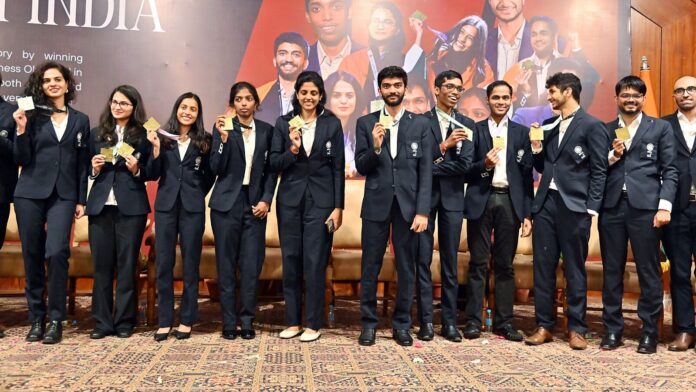It was parents who were not financially well-off who flocked to this coaching centre with their children in tow. One such parent was Nagalakshmi. She admitted both her kids to this coaching centre. Every day, she would take her kids to the coaching centre and back in a local bus.
Her husband Ramesh Babu worked at a bank. His mobility was restricted by a childhood bout of polio that left him with a disability. Overall, it was an ordinary setting. Can extraordinary magic bloom in such a setting?
Two weeks ago, both Indian men and women created history by winning gold medals at the Chess Olympiad in Budapest. Ramesh Babu’s and Nagalakshmi’s kids Praggnanandhaa and Vaishali were part of that world-beating Indian team.
How did Praggnanandhaa and Vaishali, who came from modest backgrounds, reach the highest levels in the world of chess? That too, in a matter of just a few years? Does the success of these chess champions provide any lessons for India as the country prepares for a Viksit Bharat by 2047?
To answer these questions, we must go back to Madras, as it was called, in the 1970s.
Back then, a six-year-old boy named Viswanathan Anand had just started playing chess. He learnt his initial lessons from his mother, Sushila Viswanathan. To teach Anand more about the board game, she enrolled Anand for chess classes at the Tal Chess Club in the Soviet Cultural Centre, Madras.
This facility had some books on the chess strategies adopted by a few of the Soviet Union’s greatest players. Anand devoured the contents of those books in no time.
Later, when Anand’s father moved to the Philippines on an assignment, Anand’s mother had access to a programme on chess broadcast by a local TV channel. Anand used to be in school while it was aired, so his mother would take notes from that show to discuss with him once he returned home.
There is one significant difference between the times Anand started playing chess and Praggnanandhaa began. Along his learning path to become a world chess champion, all Anand could depend on were the few library books he had access to and his mother’s notes from a TV programme.
But today, thanks to the internet, Praggnanandhaa and other chess players have access to millions of times more information on the game than what Anand had.
The kids who are practising their chess game today have access to the strategies of the world’s best chess players at the click of a button, and that too at a very low cost.
Among all the other factors that helped Bloom Chess Academy create world champions out of ordinary people, widening internet availability in this country and the ensuing democratization of knowledge have played a significant role.
Although the game of chess was invented in India more than a millennium ago, only in 1987 did the country have its first chess grandmaster in Viswanathan Anand. But then, in a matter of just 37 years, India has produced a hugely impressive list of 85 chess grandmasters.
Democratized technology can indeed make a lot of difference.
This stupendous success story could answer another important question: As machines become more intelligent than humans, will technology destroy human craftsmanship?
When Deep Blue, developed by IBM, defeated human chess champion Garry Kasparov, many thought the end game of human chess mastery was near. Today, even a basic level chess program can beat the best of human chess players consistently. So the obvious question is, who wants to play against a machine and lose every time?
Actually, what has happened is very interesting. With even a basic chess program managing to defeat the best human chess player, humans have changed their attitude to machines. Chess-playing programs are no longer opponents to beat, but their coaching buddies.
Human players are using chess programs to train themselves better and hone their skills at the game. So, intelligent chess machines did not kill the game of chess. They actually helped humans improve themselves dramatically.
When people ask me whether India will reach its developed-country goal of Viksit Bharat by 2047, I offer an optimistic answer. The success of Bloom Academy is a good reminder of what magic we can achieve when technology reaches the doorstep of every Indian.
If a simple chess coaching centre on the outskirts of Chennai could take Praggnanandhaa and Vaishali, who come from a family of relatively modest means, to the highest levels of the world, why can’t thousands of such world-champion producing ventures bloom in this country?
In India , there are many ordinary parents like Ramesh Babu and Nagalakshmi with extremely talented kids and also people like M.A. Velayudham who are really passionate about their craft.
The success story of our chess players leads me to believe that when this humongous talent pool and passion are force-multiplied by the power of artificial intelligence, much more magic can happen in India. What our chess players achieved in 2024 is just a preview of what is possible for the country by 2047.
#Indias #success #chess #showing #path #Viksit #Bharat
